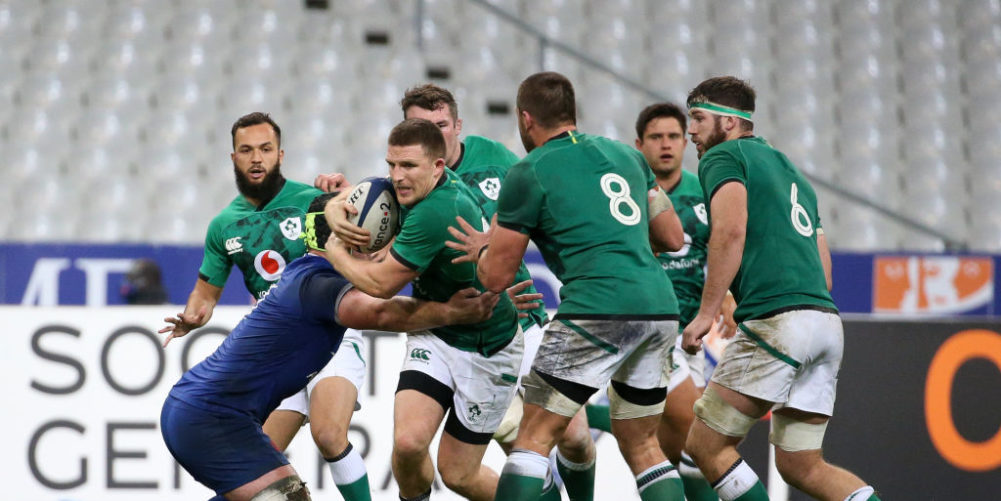RUGBY Union is fourth in the pecking order of popular team sports in Ireland, behind Gaelic football, hurling, and soccer – and yet it punches well above its weight, both on the playing field and in its administrative boardrooms.
This is thrown into sharp relief by the size of the Irish Rugby Football Union's financial reserves before the start of the coronavirus pandemic, compared to its counterparts in the Four Home Unions.
The Irish governing body was in a league of its own, recording total reserves of almost £102m in 2019. The Welsh Rugby Union was the only other national body to record positive figures last year, with a £25.3m reserve, whereas both England and Scotland held a negative position.
The Scottish Rugby Union has maintained a consistent reserve deficit since 2011, which had reduced to minus £4.4m in 2019 – and could have been reduced by at least another half a million if it had slashed the vastly inflated £900,000 salary paid to its chief executive, Mark Dodson.
This brings us to the RFU, and the negative reserves of minus £24.4m in 2019, which were highlighted in this column earlier this month. This focused on the £91m sinkhole in the RFU's reserves from a positive position of almost £62m in 2011, with a projection that it would have reached at least £67m eight years later if established fiscal guidelines had been applied.
Instead, the RFU's recent stewardship of English rugby's financial affairs appear glaringly inadequate by comparison with not just the Irish and Welsh unions, but also the Scots.
In the pro era the IRFU in particular has reaped the rewards for a balanced, prudent financial policy, building a strong fiscal foundation thanks to the quality of its administration under its current chief executive, Philip Browne.
This enabled the Irish union to steadily increase its reserves to the £100m threshold, while at the same time undertaking the major construction project of turning the old Lansdowne Road ground into its new incarnation as the Aviva Stadium, which was completed in 2010-11.
On top of that, it established Ireland as a playing power to be reckoned with on the world stage, securing two Six Nations Grand Slams, in 2009 and 2018, and also landmark victories over New Zealand, the first in Chicago in 2016, and then again in Dublin in 2018.
Yet, in 2011, the IRFU's total reserves stood at £28.8m, which was just under half the £61.7m held by the English governing body.
The collapse in the RFU's reserves since then is due to persistent loss-making, with its £220m PGA payment (over eight years) to the English Premiership clubs – which represented a 127 per cent increase on the previous agreement – a major contributor to the parlous financial position it was in before the pandemic struck.
A further potential financial fault-line stems from two questionable RFU deals with its corporate hospitality partners, Compass, in 2014 and 2018, through which the RFU borrowed £96m, which is scheduled to be repaid by 2028.
Last week the fiscal storm-cloud hanging over the RFU darkened when it announced in its 2020 Annual Report that its total reserves have now fallen further into the red by minus £27.1m – recording a whopping overall negative reserve figure of minus £53.9m.

Although there might be a reduction due to the RFU's decision to write off a deferred tax asset, it is unlikely to be much more than £5m, and the doubling of the negative reserve should sound the alarm over the financial position of English rugby's governing body.
The report also prompted the RFU's chief executive, Bill Sweeney, to revise his forecast in early October of lost revenue due to the pandemic from £106 million to a “mid-case scenario” of c. £145m.
Sweeney said that the RFU is projecting a four to five year recovery, which will involve cumulative revenue reductions of c. 20 per cent.
This made for grim reading when put alongside the IRFU's 2020 Annual Report. Having retained substantial reserves going into the pandemic, the Irish union was able to weather the initial onslaught of lockdown rugby, emerging after an outlay of £30m with a £71m war-chest of reserves still intact, and zero debt to service.
Part of the concern surrounding the RFU's financial management is an apparent determination on the part of the current Twickenham administration to obfuscate about mistakes that have been made, and a readiness to use the pandemic as an excuse for the dire fiscal position which had taken root before coronavirus.
This was reflected in a comment by Sweeney to questions received from grassroots clubs about the shrinking share of RFU investment in the community game in England compared to the professional game, with long-standing policy of a 50-50 split abandoned for a new allocation which is closer to 30-70.
Sweeney responded that if the £220m costs of the PGA agreement were taken out, then the split between community and pro is about 50-50. The smoke-screen answer did not go down well with the community sector, especially after the RFU chief executive's unsubstantiated reasons for slashing the funding of the Championship clubs earlier this year.
The RFU's best policy going forward is to be transparent in all regards, and especially in communicating with its member clubs. This applies not just about the fiscal failings laid bare by the comparison with its Irish counterpart, but also in producing a clear, coherent, detailed plan about how it intends to fix the financial mess it is in.
It is a matter of urgency.

























